Life-saving aid effort continues across Horn of Africa
Life-saving aid effort continues across Horn of Africa
Ethiopia
In Ethiopia, UNHCR has deployed an emergency team to the Gode area, some 250 kilometres north of the refugee camps at Dollo Ado. In coordination with the Ethiopian authorities, UN agencies, and NGOs, we are responding to an estimated new influx of some 18,000 new refugees from Somalia. Our team includes experts in health, nutrition, protection, field coordination, and registration. Their task is to profile and register the newly arrived refugees, identify needs and deliver aid. We will also help transport those refugees who are willing to be relocated to the existing camps in Dollo Ado.
To meet the needs of this new group, we will be airlifting in aid for up to 20,000 people from our stocks in Dubai. These are basic aid items - blankets, plastic sheeting, jerry cans, kitchen sets, sleeping mats, buckets and mosquito nets - and they are expected to arrive in Addis Ababa by the end of the week from where they will be immediately dispatched to Gode. Some 3,000 tents, supplied locally, are also being rushed to the area.
A priority for us remains the need to save lives among this badly weakened population. Ensuring that new arrivals get food, water and medical attention is critically important. Several NGOs with field presences in the area are already making limited interventions in the areas of health, nutrition, and provision of water. UNHCR will provide additional support where necessary.
We remain concerned about the persistently high mortality rate at the Kobe camp in southeast Ethiopia, which has a population of 25,000 people. A major cause of death is suspected measles. The high prevalence of acute malnutrition, combined with poor hygiene practices, is compounding the problem.
A mass immunization campaign was conducted last week for children between the ages of six months and 15 years. It will take 10-14 days for the vaccine to be effective and thus for the mortality rates to become lower. Together with UNICEF, UNHCR has just completed a second mass measles campaign in the Melkadida camp. Polio vaccination and screening for malnutrition were carried out at the same time for children. We have also been decentralizing nutrition services, and increasing our community outreach and active case-finding work.
Somalia
In Somalia, distributions of Emergency Assistance Packages, which include shelter materials and other aid items have been continuing in Mogadishu and southern Somalia. Despite these deliveries, there are still many needs in the makeshift settlements in southern and central Somalia that accommodate many of the country's estimated 1.4 million internally displaced people (IDPs). In addition to shelter, people also need food, access to clean water and medical facilities.
Displaced Somalis tell our staff that the current weather conditions of scorching sun, strong winds and intermittent heavy rains are difficult to endure, despite plastic sheets having been provided for shelter. To meet the existing needs, a further 20,000 emergency assistance packages are being loaded at our emergency warehouse in Dubai onto a ship which is scheduled to sail this coming Thursday (25 August) and dock in Mogadishu port on 10 September for distribution across southern Somalia. In June and July alone, UNHCR aid distributions inside Somalia have tripled - reaching more than 180,000 people.
Kenya
In Kenya, we continue to relocate refugees from the outskirts of the three camps that make the Dadaab refugee complex (Ifo, Dagahaley and Hagadera). Refugees are being transported by bus to the new sites. As of yesterday (Monday 22 August), more than 18,000 refugees had been moved to the Ifo 3 part of the Ifo extension. Relocation of refugees to the Ifo2 area, which began on 18 August, is ongoing. So far 3,800 refugees have been moved to this site.
On Friday (19 August), we also began moving refugees from the outskirts of the Hagadera camp to the Kambioos site. As of yesterday we had moved more than 1,100 refugees to this site, which has capacity for up to 120,000 people. The three Dadaab camps currently host an estimated 440,000 refugees. On average we still see around 1,200 refugees arrive from Somalia every day.
Learn more about the crisis in the Horn of Africa and how to contribute by visiting the UNHCR Horn of Africa emergency donation site. For the latest updates follow us on Facebook or Twitter.
For further information on this topic, please contact:
-
In Nairobi UNHCR regional office: Ron Redmond on mobile +254 734 564 019
-
In Nairobi UNHCR regional office: Needa Jehu-Hoyah on mobile +254 734 564 018
-
In Nairobi UNHCR Kenya office: Emmanuel Nyabera on mobile: +254 773 995 975
-
In Kenya, UNHCR Somalia Office: Andy Needham on mobile +254 733 120 931
-
In Ethiopia: Kisut Gebre Egziabher on mobile +251 911 208 901
-
Laura Padoan on tel: +252 618389306




